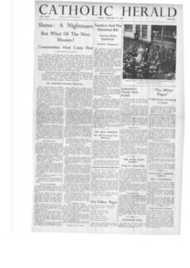Page 4, 14th February 1936
Page 4

Report an error
Noticed an error on this page?If you've noticed an error in this article please click here to report it.
Tags
Share
Related articles
Essays
New Paperbacks By Peter Fleming
Rescue From The Commercial Renaissance
Fiction Brett Young's Gift Book
Rugged Realities From Cowper Powys
The Po ys Brothers
The Powys Brot ers. By Richard Heron Ward. (The odley Head. 7s. 6d.).
Dorset Essays. By Llewellyn Powys. (The Bodley Head. Ss. 6e1.).
Reviewed by OSBERT BURDETT
Unavoidably, it is a little solemn to write a study of author(s) still alive since, being alive, the evide4e of the works is incomplete and some later change may modify previous interpretation gravely. Mr. Ward, if rash, has done; his work well, but within a limit that cramps it in one vital respect. As a sympathetic and discerning interpretation by an admirer, particularly of that sprawling titan of the family, Mr. John Cowper Powys, the book is excellent and written excellently. Every other admirer should possess it and will be grateful; but in that part of criticism, however sympathetic (and criticism without charity is corrupt), that involves detachment, that involves seeing the subject also from the outside, the book is disappointing.
Mr. Ward says, that " an interpretation" by Mr. J. C. Powys of " great dead spirits" is " if passionate certainly not pure," a limitation that applies to the characterdrawing in his novels. It is not pure because, though there is a little mad Powys in everybody, else he would fail to touch us, his over-concentration on this strain produces a sense of distortion. His failure is the lack of repose in his work. As the reviewer once ventured to put it elsewhere, the feverish activity that drives him is a baffled search for poise.
Mr. Ward half-discerns this, but not clearly enough to emphasise the fact and so to offer an explanation. Is not the explanation that the most tireless ego can never unassisted invent or discover by itself alone, and in scorn of all that we have inherited, a satisfying philosophy? It will_find fragments, sometimes marvellous fragments, but the mosaic will not fall into shape, and will remain at too many points a beautiful heap of un;harmonised tessarae. Mr. J. C. Powys, in short, is in an extremity of individualism, a " solipsist " as philosophers call it; and, do what he may, he cannot escape from that nightmare: a nightmare often enough faithfully and vividly evoked by him.
The other members of this talented family are also considered with discernment by Mr. Ward, whose book, within its limit of discernment, could scarcely be better. The family, under its own spell, is drawn with a loving and skilful hand.
Mr. Llewellyn Powys's new volume of essays remains the work of the sympathetic and scrupulous writer he has always been: his bravery in illness, his love of the countryside, and of all living things shine in it. His intellectual weakness is his humanitarianism and the wistful acceptance of death that goes with the refusal of the Christian faith (and hope). We know not whether to smile or to cry, for example, when we read : " If there is an administrative machinery sufficiently strong . . • . to enforce peace "! Machinery! As if that were any use without the will to use it aright, as if the will must not derive from a common religion, as if there were any doilbr which religion it must be!
blog comments powered by Disqus

















